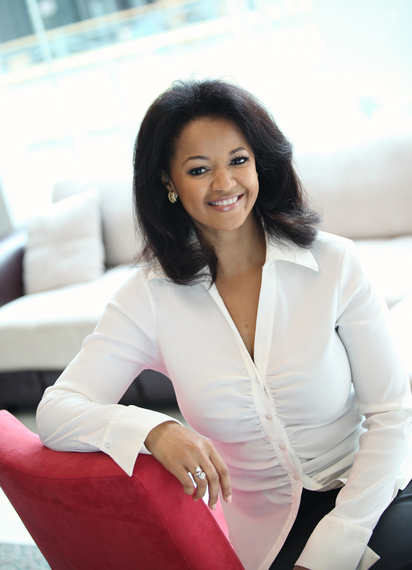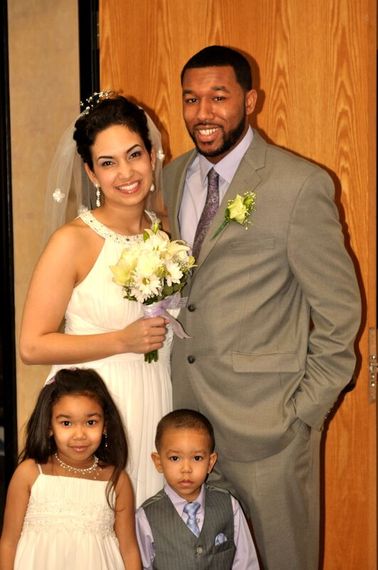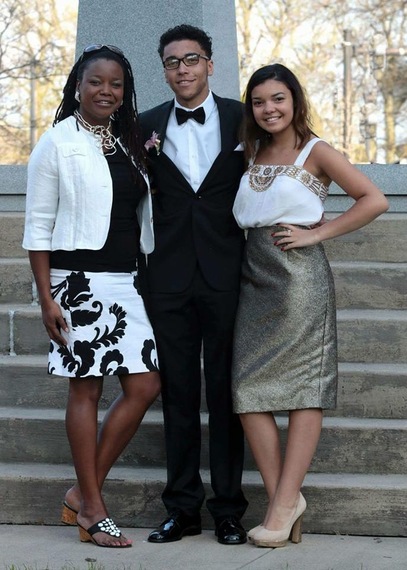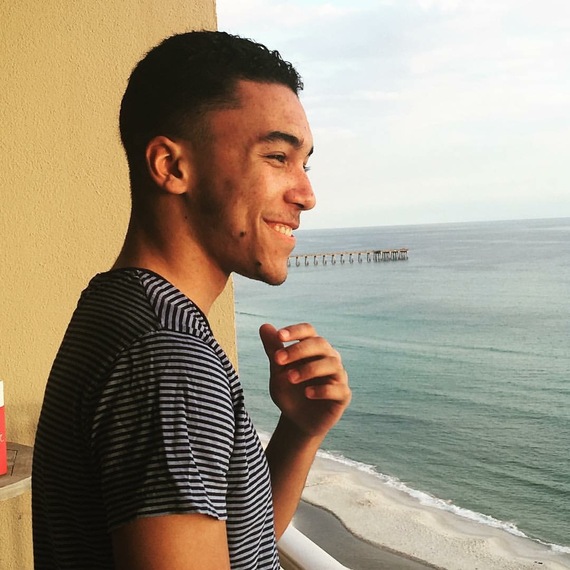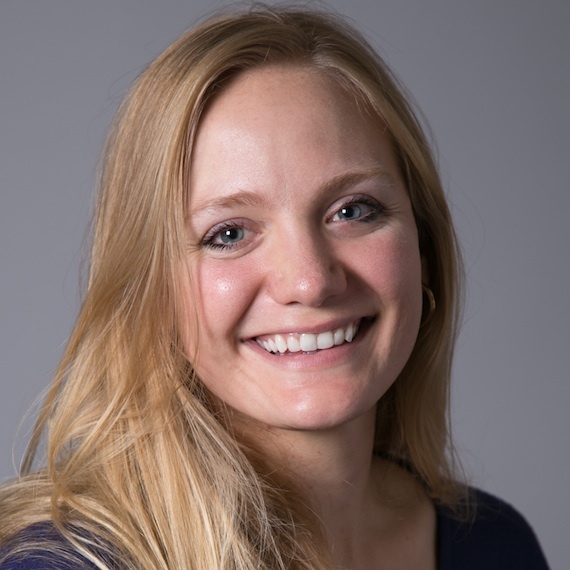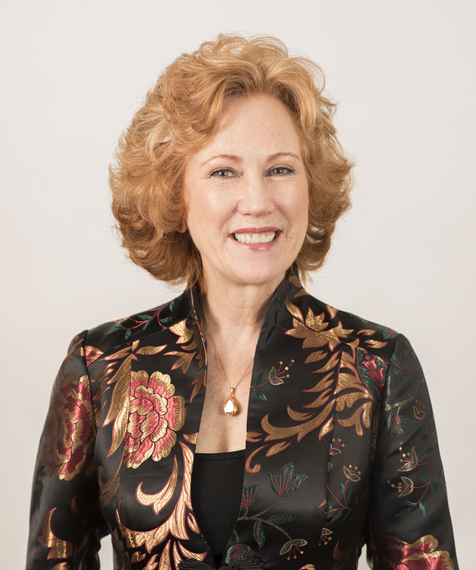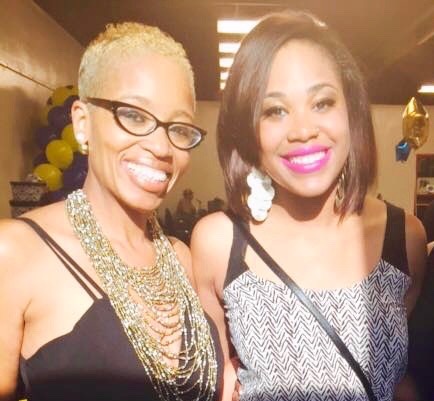I'm not ashamed of who I am...now.
But there surely was a time when I lacked confidence in toting my blackness. There was a time when being called the n-word left a stain on my esteem and childhood pride.
There were many instances stemming from being an 8-year-old at an all-white Catholic school, where the kids called my skin color "dirty." Then there times in the classroom where kids lost pencils or markers and I was pinpointed as the thief and paddled. That happened more times than I could count and it was usually followed by the kids later discovering their items on a bus or in their parents' car. Never an apology from school officials. Never. I couldn't identify any other reason for the roughing of my hind-end besides the color of my skin.
Then there were the other incidents that alleviated that guesswork. Like the time I was walking on campus at the University of Akron with a white friend and a car carrying three white boys sped by. One tossed rocks at me while another screamed, "Go home you dumb nigger!" It hurt, both their words and the stones.
This wasn't the world I wanted to live in but it sure as hell existed. For me, it existed on another side as well.
My "dirty" skin was interpreted as too "fair-skinned" by many of my black counterparts. My one quarter of European bloodline was problematic to another group who denied me access to their circle of blackness.
I was well into my 20's before I could grasp hold of the significance (and beauty) of my ethnic background and all the shades of people who joined together to help me become me. I was born this way and I don't apologize for it. I don't need to wear a t-shirt promoting black pride or tote a banner describing the pain I experienced during my formative years. It happened. It's over. Let's Move On.
While moving on though, I can't ignore what's happening in our nation today. I continue conversing with others about their experience regarding racism and hatism. I'm trying to wrap my head around the fact that America is so darn tough-spirited, stern and richly populated yet also shaky, divided and poorly informed on race relations.
In a recent New York Times article, people are finally being upfront about race. Sixty-nine percent of Americans now say that race relations are bad. Things are bad but it's not irreparable.
We can do better than this, America.
Past pain is just that...in the past. I refuse to allow those unpleasantries of the past dictate my future. Those incidents from the early years, while unfortunate, can't possibly belong to how I perceive white people or the world today. My life has been enriched by a wide spectrum of people.
This is the America I believe in. This is the America I hope we all can believe in.
I'm not alone in wanting that for our great country. I talked to 10 friends, professional women who are very much pushing for change in their circles, America and the world. I've learned that the majority of my most valuable lessons in life and business come from people who have a different paradigm than me. Our points of view beautifully pave the way for lessons in success, personal development and humanity.
Connie Hill-Johnson
Age/Profession: 56, Business Owner-Visiting Angels Homecare Agency
Nationality: African American
Cleveland, Ohio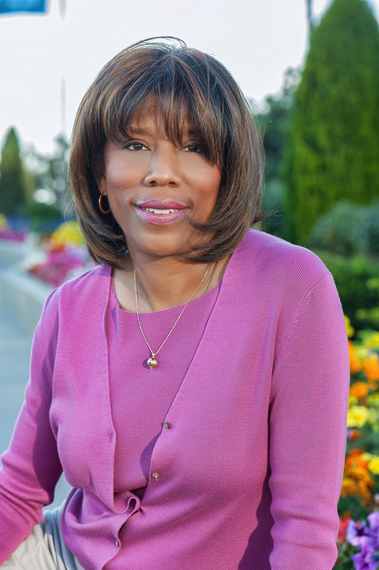
On Being a Black Woman in America:
I was the only black woman in a professional group for women-owned businesses for several years. It was just a matter of time, I knew, before the question would be asked.
"Connie, I've been wanting to ask you something for a while," one of the women said. "Uh oh," I thought. "Here comes the question." So she asked, "How does it feel being the only African-American woman in this group?" I must admit I was well prepared, because as I said, I knew the question would come eventually, particularly after a few glasses of wine.
I responded with, "I'm glad you asked," and proceeded to share my thoughts on what it felt like each month, attending our monthly meeting, entering the room and never seeing anyone who looked like me. I told them that there was a side of me that they would likely never know; the "real" me that only my black "girlfriends" really knew. The look on some faces was real surprise at my openness. I talked about shopping and many times having the sales clerk go to the white woman before me, when I was clearly the one there first. I talked about how whites are surprised when I tell them that I grew up in the Glenville area of Cleveland (the inner city) and that I have two degrees and own a business. I shared so much more because I wanted them to know or at least be able to empathize with what it might be like to be in my place.
So I asked them how they would feel if they walked into a group of all black women and they were the only white one there; would they stay? interestingly enough, many said they wouldn't do it; wouldn't feel comfortable at all; that they would drop out of the group. I responded with, "Yet I'm still here, still coming to the monthly meetings, building new relationships, because this is just the world we live in."
Fatima Fahs, MD,
Age/Profession: 26, Physician
Nationality: Lebanese-American
West Bloomfield, Michigan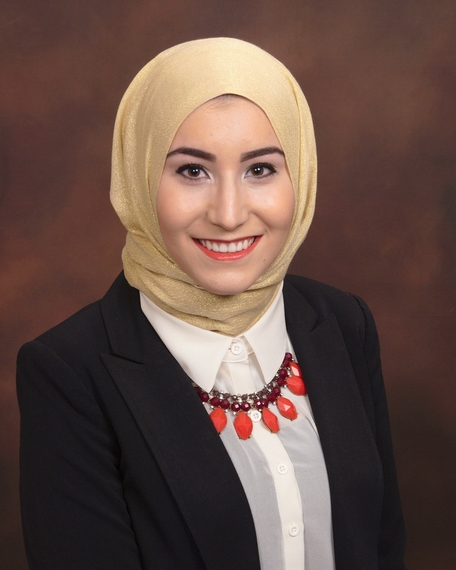
On When People Look at Me I Think, They Think:
"Terrorist. Oppressed. Uneducated. Extremist. Voiceless. Weak."
I was born and raised in America. Yes, I am a Muslim. No, I do not have an accent. Terrorist? I hate ISIS more than you--they've targeted and killed more Muslims than non-Muslims. Oppressed? Maybe by American standards, which tries to shove the importance of sexuality down the throats of girls before they even have a chance to finish puberty. Uneducated? I earned my education as a doctor through the work ethic instilled in me by my immigrant parents. Extremist? You could say I'm extremely pissed off that I have to constantly explain that a hijab over my head should in no means discount a white coat around my shoulders. Voiceless? Maybe from screaming so damn loud that the actions of a few don't define the faith of 1.6 billion people across this globe. Weak? Walk a day in my hijab, take on the slander that's screamed at me and the hateful stares thrown my way. Then stand back up and let me know if you could do it again--with pride.
I am none of the things you think when you look at me. If only you saw me for who I am and not for what you've been conditioned to see. My name is Fatima Fahs, I'm a proud American-Muslim-Lebanese woman. I'm not going anywhere, get used to it.
Jeanne Porter
Age/Profession: 70, Founder, Women in Business Networking and Consultant
Nationality: American
Dayton, Ohio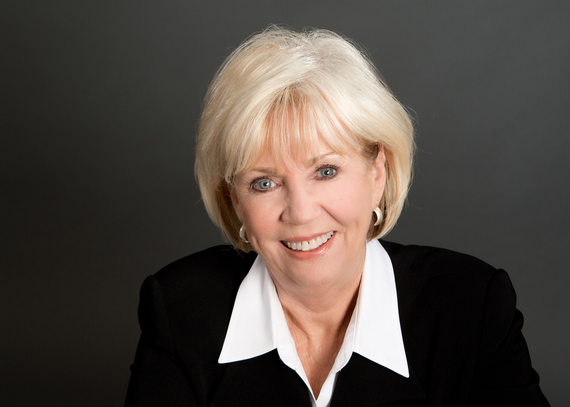
On Being a White Woman in America:
We can't help what color skin we were born with. What matters is how you respect others or how you respond to various issues of our country. What's important is do I support policies that help even the playing field for all? As a white woman in America, I don't think I am better than others of a different ethnicity. But I also realize not everyone feels that way. It's unfortunate that society has distorted the humanistic side of why we were created and for what reason we were created.
On Empathy in Race Relations:
As a white woman in America, my desire is to find a solution to end racism. I truly believe if you're not part of the solution, you're part of the problem. For me if feels uncomfortable and it's offensive to be segregated because of our skin color, and it's something I've never done to another person. Today, people have become too familiar with being apologetic for what they are, whether it's their religion, race, gender, political affiliation, financial standing, or being proud of their heritage. I still believe that, regardless of any of these factors, if you are a decent, hard working person who is a good steward to those around you, you should never feel pressured into apologizing or feeling less for who you are or what color your skin is.
What I Fear Most About the Divide in America:
It's not so much what I fear most about the divide in America, but my question is how did we become such a "fearful" society in the first place? Perhaps this would be the best place to start the discussion.
On Being a Hispanic Woman in America: It's difficult to handle sometimes but not in the way most people might think. My husband and I have encountered multiple incidents where black women have said out in public, "Why is it that all black men date outside their race?" or "Look at that fine black man with that "Mexican," and then you wonder why black women can't find good black men because the Hispanics are taking them all."
As a Puerto Rican woman, I am offended in so many ways, and hearing this rhetoric is extremely uncomfortable. One, they assume and make up words about my nationality and two, it shouldn't matter if you're dating outside your race. If your significant other makes you happy, and truly loves you for you, then their race shouldn't be a factor to anyone, especially those who are not involved in the relationship.
On What Scares Me Most About Race in America: I'm a mother of a 6-year-old daughter and a 5-year-old son and I fear that my children will grow up experiencing too much negativity and harsh treatment because of the hatred people have toward each other. If we all learned to love and respect each other, than the world would be a better place for our children because they are our future.
Keesha Richardson
Age/Profession: 38, Public Relations Professional for school district
Nationality: African-American
Indianapolis, Indiana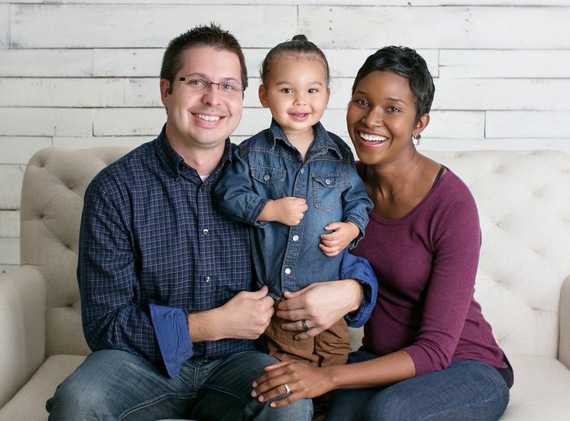
On Being a Black Woman in America:
I love being a black woman. I love belonging to a community of strong, resourceful, and fierce people. I also love the village of strong black women who support me. As a black woman who's also an introvert, I tend to be quiet but I have to be extra cognizant of making sure I'm not perceived as angry or standoff-ish. Perhaps this is a fear of all introverts, but I suspect the unwarranted "angry" label is one that many black people worry about.
On a more superficial level, I love the darkness of my skin and the texture of my hair. All of the things that I rejected when I was younger, I've learned to embrace in my adulthood. I still receive messages that I'm not the standard of beauty. I no longer internalize that.
On Being a Black Woman With a Biracial Family in America:
The experience of my interracial family has been mostly positive. Sure, we receive the occasional disapproving glance, but we find most people to be respectful. That said, we make very deliberate decisions about where we choose to go and whom we choose to spend time with. For example, we probably wouldn't plan a vacation in a place where there's no diversity. We also embrace settings where our child can be exposed to families that look like ours and families that represent other nationalities or religions. We don't want our son to have a narrow view of "normal."
On Empathy in Race Relations:
When I encounter people who seem to lack empathy, racially speaking, I tend to wonder if it's due to a lack of cross-racial interactions. For the first half of my life, I was one of only a handful of black people in most social situations because I grew up in a small, southern town and went to a predominantly white school. I learned to acclimate. However, if you're not a person of color, you are probably not frequently placed in situations where you are the minority. Once I invited a friend to an event. Her response: "Will I be the only white person there?" I was a little annoyed, but not surprised by her question. Truthfully, she might've been the only white person there if she had chosen to go. If I opted out of every situation in which I was the only black person present, I would've missed out on a lot of awesome experiences.
On Accepting Our Differences:
Our strength is in our diversity.
On Healing and Moving On:
If we are ever going to heal and move on, we have to talk about race and privilege in this country. We have to reject the notion that racism doesn't exist because our President is black or segregation ended long ago. People of color have to be allowed to speak their truths without being dismissed as playing the race card. White people have to be willing to listen, even when it gets uncomfortable. Then together, we must examine and dismantle the systems that are in place that are counterproductive to inclusion and equality.
On What I Fear Most About the Divide in America:
I fear the divide will cause my son to live his life in fear. When he's old enough, I want him to drive his car down the street without feeling the trauma of what might happen if he's pulled over. I want him to apply for jobs without worrying that the hiring manager is projecting his or her racial biases onto him. I want him to date any race or culture he chooses without worrying that he may not be accepted by his girlfriend's family because he's half black. There are enough worries in life. Race shouldn't be one of them. I want my son to live freely, without fear.
Darlyn A. McDermott
Age/Profession: 43, Risk Management Executive
Nationality: Half Italian, Half European and Cherokee mix
Canton, Ohio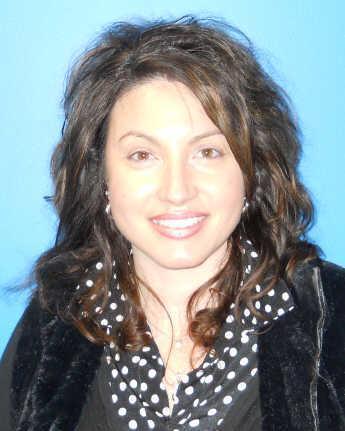
On What I Fear Most About the Division in America:
I am a single, early 40's, well-educated, successful business professional who is an active civic and non-profit community leader. Born and raised in Northeast Ohio, I have had the pleasure of living, working and leading in seven different states coast to coast through corporate relocations. I have always been single, have always been the new leader and have always been the new neighbor. Through these experiences, my perspective was deepened, my convictions were challenged and my character was toughly honed. Those diverse living experiences forced me to blend in, figure it out, and adapt to and embrace fully... my surroundings. The fabric of my life, not to mention the contacts in my phone, will be forever richer because of the ability to be respected, accepted and valued by a diverse set of people groups. I firmly believe this happened because I extended the same to them and sought first to understand not understood. I was intellectually curious and genuinely interested in how to make my new work and civic settings better. I was intent on learning.
What I fear most about the division in America is the parochial view that keeps drawing us back to considering race first in most social issue discussions. Race itself is not a social issue; it is an adjective describing people. No different than we use wealthy or educated or single or married to describe people. These are micro details in the more macro issues that are in fact the social issues causing the American Divide. The macro view entails looking at education, coping skills, socio-economic status, moral upbringing and kindness factor. The bottom line is that the American Divide is about the people who have access and accountability surrounding these life tools and then the people who don't. It is that simple. When we understand that, we can then begin to address the social issues tearing our country apart right now. When we can find a way to empower, educate and support all people with these non-race centric tools, only then will we see a change in attitudes, which will lead to changes in behavior. This then will start bridging the gap of the great American Divide.
Crystal Davis Weese
Age/Profession: 45, Cosmetology Instructor/Managing Stylist
Nationality: Black/African American
Mansfield, Ohio
On Being a Black Woman in America:
Makes me feel like a graceful warrior most days. Because often the attacks of the character on my beautiful black children, father, mother, brothers, uncles, aunts, and cousins Is exhausting and painful. It feels as if people don't think glib comments aimed at black people will sting, or maybe they just don't care that they do.
The constant questioning, "Why do blacks do (this/that...)." Or outright mistruths and insults about our community. And let's not forget the unwanted touching of my locked hair. And the look of shock when I ask, "Why are you touching me?"
We live in a world that frequently denies black women their beauty or femininity. And some of my fellow sisters have given up trying to be feminine because they have to fight and it's exhausting.
I will never give up, give in, or stop speaking up for what and whom I truly believe in. It's important that I am this graceful warrior that must fight to protect, teach, strengthen and educate the whole human community.
On Being a Black Mother of a Black Son in America:
I have raised him to be a leader, to question, to respectfully challenge and to think critically. Because he is all of these things, have I placed a bulls-eye on his back? It is stressful to think all of his gifts (athletic, scholar, confident, charismatic, courageous and handsome) are what creates fear in this America.
On Being a Black Woman with a Biracial Family in America:
Makes me no different than any other mother: We all love our families deeply, and want safety, education, equality and fairness for our children. 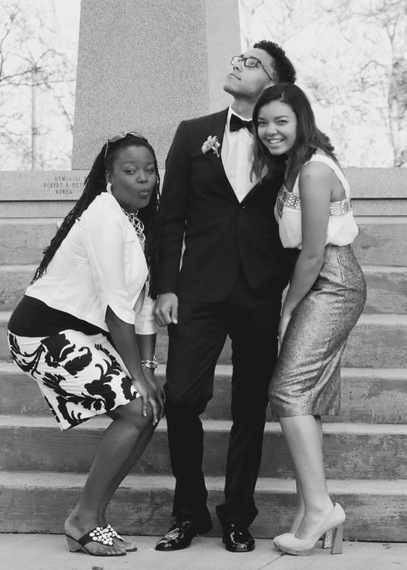
What I Fear Most About the Divide in America:
That we are unraveling all of the mending that had been done in the past. That this America that my children and grandchildren now face is as ugly as the America their ancestors fought so hard to change.
On What I Fear Most About the Division in America:
Implicit bias. I wonder how far we as a nation will be able to go if the media and the systems upon which we've build our country continue to pelt us with this dichotomous imagery and association: Positive associations are made with white or European faces, while negative associations are made with black or African faces. This narrative is so deeply woven into our fabric that it's even the case that a significant percentage of black individuals who take Harvard's online implicit association test (IAT) are biased against faces of their own color. Is it possible that, toward the progress we're aiming to achieve, we can begin to de-bias as a people? Can we begin to project images of, for instance, young black males in sweatshirts and associate them with kind words and positive imagery? How can we ensure that the first thought in an officer's mind when a black man reaches for his license and registration and communicates to the officer that he legally carries a weapon isn't, "He's about to pull out his gun and use it against me"? I have no intentions here of absolving anyone of accountability to their actions, but I do wonder...how deep do we need to go to begin to push the needle? It's disheartening that so little -- if anything -- has been done.
Roxanne Kaufman Elliott
Age/Profession: Old enough to know who I am, I3 Leadership Mater, Speaker, Author
Nationality: Caucasian/American (Irish and German heritage)
Avon Lake, Ohio
On Being a White Woman in America:
We don't know what we don't know. We can only know our own experience and pain - we cannot know another's. This is true regardless of culture, color, heritage, religion, sex, sexuality, profession, education, where you grew up, how much money you make and all the rest. And yet, we sit in judgment on others for all of these things and more. I am a white woman who grew up in a middle class family with parents and siblings who loved me. I was lucky and blessed. But none of that lessened the pain of being judged, humiliated, misunderstood, abused and harassed - all because I looked a bit 'different.' And my difference is miniscule compared to most others who go through this trial. I can only imagine the magnitude of pain felt by those whose differences are judged so much more harshly. But again, our own pain is all we can really know, but oh my, what we can do with it if we just pause for a moment and let it steep in our hearts and let our empathy, compassion, understanding and intelligence prevail? Perhaps if we all spent more time in non-judgment of ourselves and others we could make a difference. A real difference. What can you do today to not judge? What can you do today to help others do the same? Be the pebble in the pond.
On When People Look at Me, I Think They Think:
She has red hair - I'll be she has a horrible temper.
On Accepting Our Differences:
Meet people where they are. Be real. Trust (but lock your doors).
What I Fear Most About the Divide in America:
That it will become a cancer that destroys our great country.
Sylvia C. Jordan
Age/Profession: 46, Social Worker
Nationality: African American with 1/8 Cherokee Indian and 1/8 European.
St. Petersburg, Florida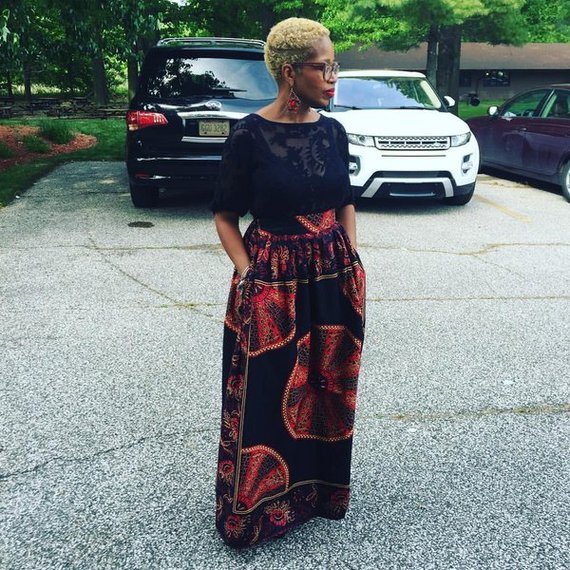
On Being a Black Woman in America:
It's challenging. I feel I have to work twice as hard and present myself in a professional manner at all times just to get respect. For example, when I relocated to Florida I began searching for work in event planning. I applied for a job at a high-end hotel on the beach. Armed with the appropriate attire and resume, I learned they were interviewing on the spot. As I approached the interviewer, her demeanor changed. She looked at me coldly and rolled her eyes. She was white. She immediately started the process without a proper greeting. I believed I did a great job but at the end once again, she gave me that stare unaccompanied by a proper send-off.
I moved on to complete paperwork and observed a white female who was dressed inappropriately with a very short, low cut dress and flip flops make her way inside. The interviewer smiled the entire time and thanked her. The interviewer called someone and talked the applicant up and glanced at me with that look. Was it because I was black?
I know about feeling racial tension because I grew up in an all-white neighborhood (we were the first black family on the block in 1970). I don't remember any difference until hearing my parents speak to a neighbor about a secret meeting at the fire station to get us out of the neighborhood. One day, "Go Back to Africa Niggers" was carved out in our driveway.
In elementary school I was the only black girl in class. In gym class when we held hands to square dance, the kids near me were quick to wipe their hands afterward.
I had a great friend who was my neighbor. We rode bikes, jumped rope, walked to the store every day. When I was about 12, they got a swimming pool and she stopped speaking to me. I was informed that the family did not want any black people in their pool. That hurt me.
Eventually, though I did excel and land great friendships with some whites. Through all of it, my parents always taught me to love my culture. Be proud of who I am. They brought us a set of Black Encyclopedias so when I had a history assignment, I could focus on a black historian, someone relatable.
I don't regret any of it. I learned so much about the white culture and it taught me how to interact with different cultures and also what signs to look for (subtle clues) in seeing racism or someone who is just curious/clueless/innocently unaware. That is why I like to listen before I react because not every white person with a thought or a question is being racist.
On Accepting Our Differences:
I love embracing our differences. I go to a diverse church (white, black, Latino, African, etc.) and being in that environment I've learned so much. I've attended an African wedding, Latin Festivals. I think our differences are what make America... AMERICA! I want others to learn and see that they don't have to be intimidated by people who don't look like them. I have taught my daughter to live by these same values.


